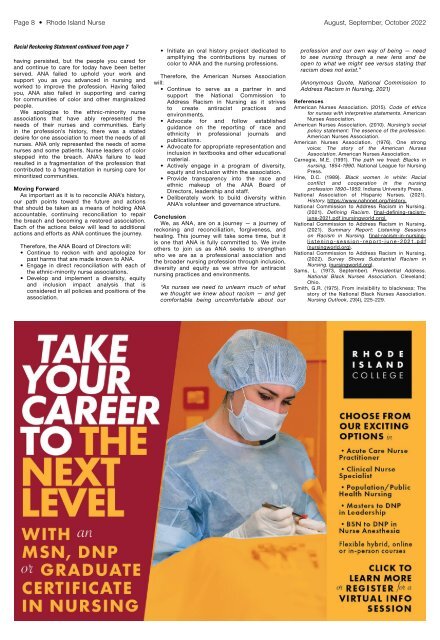Rhode Island Nurse August 2022
You also want an ePaper? Increase the reach of your titles
YUMPU automatically turns print PDFs into web optimized ePapers that Google loves.
Page 8 • <strong>Rhode</strong> <strong>Island</strong> <strong>Nurse</strong> <strong>August</strong>, September, October <strong>2022</strong><br />
Racial Reckoning Statement continued from page 7<br />
having persisted, but the people you cared for<br />
and continue to care for today have been better<br />
served. ANA failed to uphold your work and<br />
support you as you advanced in nursing and<br />
worked to improve the profession. Having failed<br />
you, ANA also failed in supporting and caring<br />
for communities of color and other marginalized<br />
people.<br />
We apologize to the ethnic-minority nurse<br />
associations that have ably represented the<br />
needs of their nurses and communities. Early<br />
in the profession’s history, there was a stated<br />
desire for one association to meet the needs of all<br />
nurses. ANA only represented the needs of some<br />
nurses and some patients. <strong>Nurse</strong> leaders of color<br />
stepped into the breach. ANA’s failure to lead<br />
resulted in a fragmentation of the profession that<br />
contributed to a fragmentation in nursing care for<br />
minoritized communities.<br />
Moving Forward<br />
As important as it is to reconcile ANA’s history,<br />
our path points toward the future and actions<br />
that should be taken as a means of holding ANA<br />
accountable, continuing reconciliation to repair<br />
the breach and becoming a restored association.<br />
Each of the actions below will lead to additional<br />
actions and efforts as ANA continues the journey.<br />
Therefore, the ANA Board of Directors will:<br />
• Continue to reckon with and apologize for<br />
past harms that are made known to ANA.<br />
• Engage in direct reconciliation with each of<br />
the ethnic-minority nurse associations.<br />
• Develop and implement a diversity, equity<br />
and inclusion impact analysis that is<br />
considered in all policies and positions of the<br />
association.<br />
• Initiate an oral history project dedicated to<br />
amplifying the contributions by nurses of<br />
color to ANA and the nursing professions.<br />
Therefore, the American <strong>Nurse</strong>s Association<br />
will:<br />
• Continue to serve as a partner in and<br />
support the National Commission to<br />
Address Racism in Nursing as it strives<br />
to create antiracist practices and<br />
environments.<br />
• Advocate for and follow established<br />
guidance on the reporting of race and<br />
ethnicity in professional journals and<br />
publications.<br />
• Advocate for appropriate representation and<br />
inclusion in textbooks and other educational<br />
material.<br />
• Actively engage in a program of diversity,<br />
equity and inclusion within the association.<br />
• Provide transparency into the race and<br />
ethnic makeup of the ANA Board of<br />
Directors, leadership and staff.<br />
• Deliberately work to build diversity within<br />
ANA’s volunteer and governance structure.<br />
Conclusion<br />
We, as ANA, are on a journey — a journey of<br />
reckoning and reconciliation, forgiveness, and<br />
healing. This journey will take some time, but it<br />
is one that ANA is fully committed to. We invite<br />
others to join us as ANA seeks to strengthen<br />
who we are as a professional association and<br />
the broader nursing profession through inclusion,<br />
diversity and equity as we strive for antiracist<br />
nursing practices and environments.<br />
“As nurses we need to unlearn much of what<br />
we thought we knew about racism — and get<br />
comfortable being uncomfortable about our<br />
profession and our own way of being — need<br />
to see nursing through a new lens and be<br />
open to what we might see versus stating that<br />
racism does not exist.”<br />
(Anonymous Quote, National Commission to<br />
Address Racism in Nursing, 2021)<br />
References<br />
American <strong>Nurse</strong>s Association. (2015). Code of ethics<br />
for nurses with interpretive statements. American<br />
<strong>Nurse</strong>s Association.<br />
American <strong>Nurse</strong>s Association. (2010). Nursing’s social<br />
policy statement: The essence of the profession.<br />
American <strong>Nurse</strong>s Association.<br />
American <strong>Nurse</strong>s Association. (1976). One strong<br />
voice: The story of the American <strong>Nurse</strong>s<br />
Association. American <strong>Nurse</strong>s Association.<br />
Carnegie, M.E. (1991). The path we tread: Blacks in<br />
nursing, 1854-1990. National League for Nursing<br />
Press.<br />
Hine, D.C. (1989). Black women in white: Racial<br />
conflict and cooperation in the nursing<br />
profession 1890–1950. Indiana University Press.<br />
National Association of Hispanic <strong>Nurse</strong>s. (2021).<br />
History. https://www.nahnnet.org/history.<br />
National Commission to Address Racism in Nursing.<br />
(2021). Defining Racism. final-defining-racismjune-2021.pdf<br />
(nursingworld.org).<br />
National Commission to Address Racism in Nursing.<br />
(2021). Summary Report: Listening Sessions<br />
on Racism in Nursing. final-racism-in-nursinglistening-session-report-june-2021.pdf<br />
(nursingworld.org).<br />
National Commission to Address Racism in Nursing.<br />
(<strong>2022</strong>). Survey Shows Substantial Racism in<br />
Nursing. (nursingworld.org).<br />
Sams, L. (1973, September). Presidential Address.<br />
National Black <strong>Nurse</strong>s Association. Cleveland;<br />
Ohio.<br />
Smith, G.R. (1975). From invisibility to blackness: The<br />
story of the National Black <strong>Nurse</strong>s Association.<br />
Nursing Outlook, 23(4), 225-229.
















